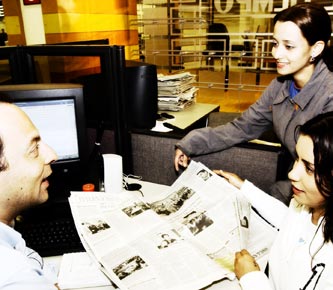Código de acceso, los jóvenes y la información
Cuáles resultados
Código de Acceso ha logrado resultados extraordinarios. Los jóvenes participantes han logrado publicar en todas las secciones del periódico, poniendo frente a la opinión pública temas que sólo era posible verlos desde la perspectiva joven, una mirada de la realidad que el periodista adulto a veces no está en capacidad de ver.
Un primer nivel de resultado es que muchos jóvenes han tenido la posibilidad de conocer cómo funciona un medio de comunicación. Esta oportunidad ha desarrollado en ellos una gran capacidad crítica frente a la información pública y los medios como tal. Este resultado se obtiene en el 100% de los jóvenes que participan de la experiencia. Participando de la dinámica propia de un medio de comunicación masivo, los jóvenes han tenido acceso a un proceso importante de formación. Durante los últimos años, las actividades de comunicación se han proyectado socialmente, generando un gran impacto en la difusión y creando una red juvenil de comunicación. Los jóvenes de Código de Acceso han apoyado y asesorado organizaciones juveniles y proyectos comunitarios relacionados con medios, adquiriendo siempre más una conciencia crítica sobre la realidad social.
En un segundo nivel, la experiencia ha motivado a que muchos de los participantes se hayan dedicado al periodismo o a la investigación periodística, bien sea desde su formación profesional, o desde su participación directa en medios de comunicación local o institucional.
Un tercer nivel de resultados es la Red juvenil de comunicación, encabezada por los miembros de Código de Acceso y sus antiguos participantes, que se encarga de asesorar y apoyar iniciativas escolares, relacionadas con medios de comunicación. En este ejercicio, los participantes del proceso de formación en la casa editorial El Tiempo apoyan a estudiantes de colegios y jóvenes organizados en sus barrios, enseñándoles lo que ellos han aprendido, para que mejoren sus periódicos o emisoras escolares o barriales. En los últimos años se generaron proyectos de comunicación en las diferentes ciudades y creando un Club de Prensa en donde los jóvenes Código de Acceso multiplican su experiencia con niños de 12 a 16 años, de colegios públicos o privados de bajo perfil socioeconómico, en Bogotá, Cali, Medellín y Barranquilla. Hoy día, el Club de prensa cuenta con 100 jóvenes que diariamente comparten su experiencia en cada institución.
Algunas de las propuestas que actualmente están siendo lideradas por antiguos miembros de código son: el Club de prensa Código de Acceso, que multiplica la experiencia con otros jóvenes de bajos recursos; el Comité página Web, que genera una propuesta de periodismo juvenil; el Comité creativo y artístico, que cuida y vela por la imagen del proyecto; el Comité investigaciones que lidera líneas de investigación que generan reflexión sobre el quehacer del proyecto y el Comité de relaciones juveniles, que genera relaciones con los jóvenes Colombianos.
Código de Acceso ha tenido reconocimientos como promotor de los derechos de la niñez y la juventud y por su labor en el fortalecimiento de medios de información escolar en el país. Aunque la innovación no ha sido reconocida formalmente en el ámbito internacional, Plan Internacional, la Fundación Restrepo Barco, y la Vicepresidencia de Relaciones con la Comunidad de la Casa Editorial El Tiempo, la presentan en sus eventos internacionales como un resultado importante en su trabajo por la juventud.
El resultado más importante es el impacto estructural que la participación juvenil ha generado en el periódico mismo.
DESCARGA EL BROCHURE PDF
inglés (0.6 MB)español (0.6 MB)
SÓLO TEXTO
•Código de Acceso en la práctica








 COUNTRY OF ORIGIN
COUNTRY OF ORIGIN